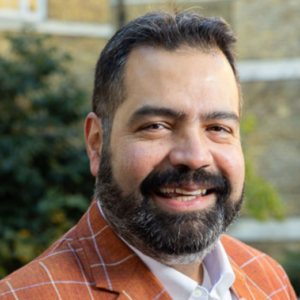
By EDI Committee Chair Nephtali Marina-Gonzalez
Professor Nephtali Marina-Gonzalez is a cardiovascular neuroscientist based in the UCL Division of Medicine. He earned his medical degree and PhD in Neuroscience from the National University of Mexico. His research focuses on the role of glial cells in regulating sympathetic nervous system activity and their contribution to the development of arterial hypertension and heart failure.
In addition to his core scientific work, Professor Marina-Gonzalez has recently expanded his research interests to include community engagement approaches aimed at addressing health inequalities. By integrating biomedical research with participatory methods, he seeks to bridge the gap between scientific discovery and real-world health outcomes in underserved populations.
Professor Marina-Gonzalez also plays a key leadership role in promoting inclusive excellence in science. He serves as the Vice Dean for Equality, Diversity and Inclusion (EDI) in the Faculty of Medical Sciences at UCL and as a General Trustee with an EDI focus for The Physiological Society
As part of our Faces of Physiology Series, we spoke to Professor Marina-Gonzalez to find out more about why EDI and inclusive spaces are important, as well as what his hidden superpower is.
Why is it important to create an inclusive space within physiology?
Creating an inclusive space within physiology is essential to ensure that the field reflects the diversity of the communities it serves. Inclusion fosters innovation by bringing together varied perspectives, experiences, and ideas—critical for addressing complex health challenges. By actively supporting underrepresented voices, we not only enrich the discipline but also empower the next generation of physiologists to lead with empathy, cultural awareness, and global insight.
A diverse leadership pipeline is vital for tackling grand challenges such as health inequities, climate-related health impacts, and emerging diseases. Physiologists from different backgrounds are better equipped to ask new questions, challenge assumptions, and design solutions that are equitable and effective. Building inclusive pathways today ensures a stronger, more responsive, and socially conscious physiology community for the future.
What is your hidden superpower?
My hidden superpower is the ability to bring people together and reconcile them. Whether it’s navigating differences, easing tensions, or finding common ground, I have a natural instinct for creating connection and understanding. I believe that collaboration thrives when people feel heard and respected, and I enjoy helping others see the bigger picture and move forward together. In a world that often feels divided, this ability to foster unity and shared purpose is something I value deeply—and quietly practice every day.
Why is EDI important to you, and what motivated you to get involved?
EDI is important to me because I believe fairness, representation, and inclusion are essential for building a healthier and more just society. What truly motivated me to get involved was witnessing the stark health inequalities that became so visible during the COVID-19 pandemic. It was a wake-up call—highlighting how deeply structural inequities affect people’s lives and outcomes.
That moment made it clear to me that change doesn’t happen passively. I felt a responsibility to be part of the solution, to help create spaces where diverse voices are not only heard but valued and empowered. EDI work is about transforming systems, and I’m committed to contributing to that transformation.
What are your hopes for the future of the physiology community?
I hope to see a physiology community that is not only inclusive and innovative but also actively engaged in decolonising its practices and structures. This means recognising and valuing knowledge systems from across the globe, especially from the Global South, and ensuring that research agendas, leadership, and collaborations are shaped equitably.
My vision is for stronger, more reciprocal partnerships between institutions in the Global North and South—where resources, expertise, and decision-making are shared, not imposed. Empowering diverse voices and dismantling historical imbalances will help us build a more just and globally relevant physiology community.
Ultimately, I hope the next generation of physiologists will be equipped to lead with cultural humility, scientific excellence, and a deep commitment to equity in health.
These are the faces of physiology. Help us see the full picture — complete our EDI survey this autumn to help shape the future of an inclusive community.
We’re always looking to celebrate our members and their stories. If you would like to share your story with us, please contact membership@physoc.org.

